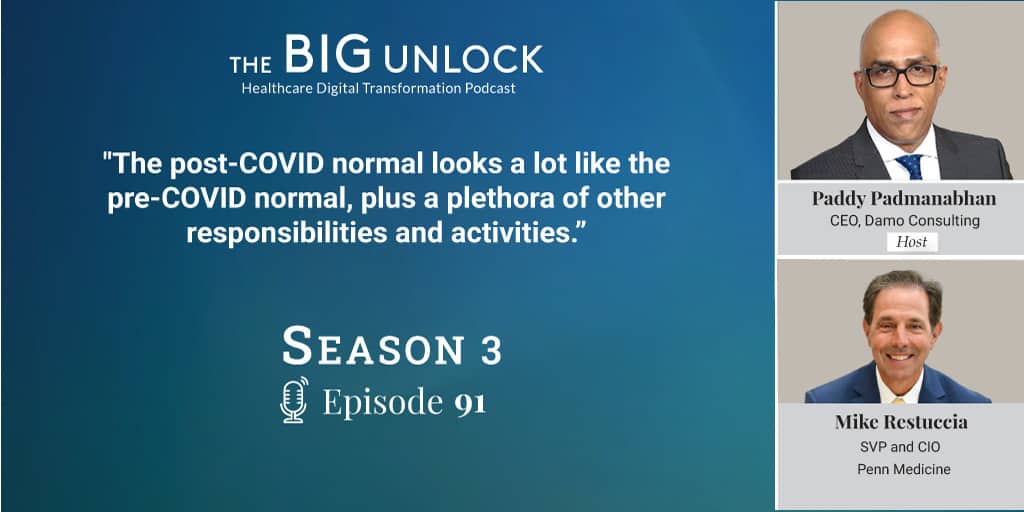
Monday, June 28, 2021
Issue 120

The pandemic has dramatically expanded the role of technology in healthcare delivery. In the new era of digital/virtual/in-person care, new technologies for telehealth and virtual care models have not replaced the existing technologies – in fact, they are new and additional layers of technology that have to be actively managed and integrated with the existing technology stack. Paradoxically, digital transformation has led to more work for CIO’s and digital health leaders.
In this piece in HBR, Damo Consulting’s Board Advisor John Glaser and others argue, among other things, that health systems must look to consolidate their IT systems, optimize existing systems, and leverage vendor capabilities to support implementations using virtual staffing models. In a separate article, a group of digital health leaders share their experiences with telehealth integration and barriers to innovation.
The market for technology innovation in healthcare has never been more robust. However, most CIO’s and CDO’s struggle to identify and evaluate digital health startups for implanting their digital roadmaps. Duke Health is among several health systems who are putting structure and governance in place for evaluating digital health startups. (For those who have not seen our white paper on the digital health solution selection process and the Damo ICEATM vendor assessment framework, here is a link.)
In my latest podcast episode, I interview Mike Restuccia, SVP and CIO, Penn Medicine. In this extended interview, Mike discusses a broad range of topics including the role of big tech and EHR companies in the digital transformation journey, his approach to technology vendor relationships, and a governance model for identifying and nurturing innovative startups. Take a listen.
Have a great week.
Paddy
Podcast of the Week
In this episode, Mike Restuccia discusses the state of telehealth in the pre- and post-COVID era and how the overall workload for the technology function has expanded significantly with the onset of virtual care models.
We thank our partners and sponsors for their support in bringing you high-quality content
This Week in Digital Health Markets
We are selectively featuring guest posts in our newsletter from senior leaders in healthcare and technology. Reach out to us if you would like to contribute a blog to one of our upcoming newsletters.
What the Pandemic Means for Health Care’s Digital Transformation
Care providers must understand the ramifications for their digital health function and agenda — and how information technology can address the challenges and opportunities of their “new normal.” Harvard Business Review
CIOs tackle barriers to innovation, telehealth integration, analytics and more
Four health IT leaders from across the country discuss lessons learned during the pandemic in the latest installment in our feature series. They spotlight some “long-term ‘change the game’ strategies” developed over the past year. Healthcare IT News
Five things about Scripps Health class-action lawsuit
The new financial risks for health systems that experience data breaches from cyber-attacks and ransomware. Modern Healthcare
‘Nobody is catching it’: Algorithms used in health care nationwide are rife with bias
The algorithms carry out an array of crucial tasks: helping emergency rooms nationwide triage patients, predicting who will develop diabetes, and flagging patients who need more help to manage their medical conditions. But instead of making health care delivery more objective and precise, a new report finds, these algorithms — some of which have been in use for many years — are often making it more biased along racial and economic lines. STAT News
Sponsored Content
Duke launches clinical center to evaluate digital health platforms, wearables, sensors The Duke Clinical Research Institute, part of Durham, N.C.-based Duke University School of Medicine, established a new center for exploring and evaluating digital health measures and technologies. Becker’s Hospital Review
Prisma Health inks 10-year clinical innovation partnership with Siemens
Greenville, S.C.-based Prisma Health has entered a10-year strategic partnership with Siemens Healthineers focused on scaling healthcare innovation, improving workforce development and launching a joint intelligence center. Becker’s Hospital ReviewHealth Catalyst to buy Twistle for $104.5M
Health Catalyst plans to acquire patient engagement company Twistle, the data warehousing and analytics company said. With the acquisition, the company hopes to bolster its set of population health tools for healthcare customers moving to value-based care models. Modern HealthcareAWS looks to digital health with new accelerator
The new accelerator will offer 10 startups a chance to participate in a four-week training and mentorship program. MobiHealth NewsRegenstrief study shows EHRs underperforming for primary care Electronic health records are overloading outpatient docs with info in “disparate files and folders rather than presenting comprehensive, actionable data in a context that gives meaning,” say researchers in a VA-funded study. Healthcare IT News
Note: Some of the articles linked in this newsletter may be behind paywalls that need a subscription.Damo Consulting Thought Leadership and Research
The Digital Health Solution Selection Process
When health systems look for solution partners to execute their digital priorities, the decision process typically looks like this. Infographic
AI-enabled physicians: rethinking care delivery
While traditionally deeply skeptical of artificial intelligence in clinical settings, in today’s fast-changing care delivery landscape many physicians are thinking more proactively about how how AI can improve quality and patient experience. Blog
AI in healthcare: The tech is here, the users are not
The biggest challenges for AI-enabled care are delivering real-time insights into the clinical workflow and gaining acceptance from caregivers as well as patients. Innovative solutions continue to emerge. Blog















